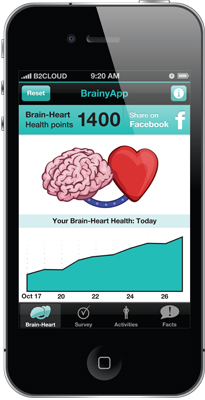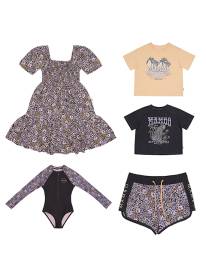BrainyApp

BrainyApp
Ita Buttrose, National President of Alzheimer's Australia, has heralded an Australian-developed, world-first app as the latest digital tool in the global fight against Alzheimer's disease and other forms of dementia.
Based on the latest scientific research that links brain health and a reduced risk of dementia, to a healthy heart and cardiovascular system, BrainyApp is the world's first dementia risk reduction app designed to help people monitor and improve their Brain-Heart health.
'Most people are aware of what they can do to reduce their risk of heart disease, diabetes and stroke but what isn't well known is that these same lifestyle choices may also lower the risk of developing Alzheimer's disease and other kinds of dementia," Ms Buttrose said.
Developed by Alzheimer's Australia and the Bupa Health Foundation, BrainyApp helps users monitor and improve the physical, mental, dietary and social aspects of their lifestyle.
'The number of Australians with dementia is expected to dramatically increase from 267,000 today to 385,000 people by 2020 – up by almost 50 per cent in just eight years," says Dr Christine Bennett, Chair of the Bupa Health Foundation Steering Committee.
'This alarming prospect should prompt us all to take actions that can keep our brains as well as our bodies healthy."
'As well as lifestyle choices, proper management of cardiovascular risk factors like high blood pressure and high cholesterol are also important for brain health," she said.
'The idea is that what is good for the heart is also good for the brain."
Dr Michael Valenzuela, head of the Regenerative Neuroscience Group at the University of NSW and author of Maintain Your Brain (ABC Books) helped to develop BrainyApp.
'People need to start thinking about their brain health earlier in life. The changes in the brain that lead to dementia can start when people are in their 30s and 40s," Dr Valenzuela said.
'Although the evidence is still developing, we are learning that there are a wide range of lifestyle choices and activities that can improve brain health, and which in turn may reduce the risk of dementia".
BrainyApp allows users to take a Brain-Heart health survey about their diet, exercise patterns and lifestyle. It then provides suggestions and ideas about how to improve.
BrainyApp also includes all-new brain games, and encourages users to build Brain-Heart points by staying physically and mentally active, socialising with friends and family, and sharing their progress on Facebook.
One of the brain games – Word Tennis – requires players to unscramble anagrams in order to move a paddle and hit a ball back to their opponent.
Ita Buttrose says it is quite a challenge but also good fun.
'I'm looking forward to improving my Brain-Heart score. I expect it might help improve my Scrabble game too," she said.
BrainyApp is available as a free download for users of iPhone, iPod and iPad devices from the App Store. BrainyApp adds to a range of new and innovative technologies such as interactive websites and GPS tracking devices to assist people with dementia, being developed by Alzheimer's Australia.
More information about BrainyApp is available at www.brainyapp.com.au
Key Facts about Dementia
BrainyApp is based on Alzheimer's Australia's dementia risk reduction program, Mind your Mind.
Mind your Mind is based on the body of scientific evidence that shows what we do, what we eat and how well we look after our health has an impact on our risk of developing dementia.
It is important to remember that because ageing and genetics also influence your risk of dementia, there are no guarantees that following the advice in Mind your Mind will prevent dementia. But it will give you the best chance of avoiding dementia or delaying its onset.
An estimated 267,0001 Australians currently live with dementia
Without a major medical breakthrough, the number is expected to soar to about 943,000 by 2050
Each week, there are 1,500 new cases of dementia in Australia. That is expected to grow to 7,400 new cases each week by 2050
There are approximately 16,000 people in Australia with Younger Onset Dementia (a diagnosis of dementia under the age of 65)
Dementia is the third leading cause of death in Australia, after heart disease and stroke
One in four people over the age of 85 has dementia
On average symptoms of dementia are noticed by families 3.1 years before a firm diagnosis is made
In high income countries only 20-50% of people living with dementia are recognised and documented in primary care.
An estimated 1.2 million Australians are caring for someone with dementia
Dementia is fatal and, as yet, there is no cure
Dementia has an impact on every part of the health and care system
The total estimated worldwide cost of dementia was US$604 billion in 2010
This cost accounts for about 1% of the world's gross domestic product
Australia faces a shortage of more than 150,000 paid and unpaid carers for people with dementia by 2029
The cost of replacing all family carers with paid carers is estimated at $5.5 billion per annum
Dementia will become the third greatest source of health and residential aged care spending within two decades. These costs alone will be around 1% of GDP
By the 2060s, spending on dementia is set to outstrip that of any other health condition. It is projected to be $83 billion (in 2006-07 dollars), and will represent around 11% of the entire health and residential aged care sector spending
Dementia is already the single greatest cause of disability in older Australians (aged 65 years or older)
More than half of all nursing home residents in Australian Government-subsidised aged care facilities have dementia9 (104,400 out of 198,500 permanent residents in 2008-09)
What is dementia?
Dementia is the term used to describe the symptoms of a large group of illnesses which cause a progressive decline in a person's functioning. It is a broad term used to describe a loss of memory, intellect, rationality, social skills and physical functioning. Alzheimer's disease is the most common form of dementia, accounting for between 50 – 70% of all dementia cases.
Dementia can happen to anybody, but it is more common after the age of 65. However, people in their 40s and 50s can also have dementia.
Alzheimer's Australia is the charity for people with dementia and their families and carers. As the peak body, it provides advocacy, support services, education and information.
National Dementia Helpline: 1800 100 500
(The National Dementia Helpline is an Australian Government Initiative)
www.alzheimers.org.au
The Bupa Health Foundation helps build a healthier Australian community through its support of important health research, health education and other healthy living programs. Established as a charitable foundation in 2005, the Bupa Health Foundation has partnered in over 60 initiatives nationally, with a combined investment of around $17 million, across its key focus areas: promoting wellness, managing chronic disease, healthy ageing, empowering people about their health; and keeping healthcare affordable.
www.bupa.com.au/foundation
Based on the latest scientific research that links brain health and a reduced risk of dementia, to a healthy heart and cardiovascular system, BrainyApp is the world's first dementia risk reduction app designed to help people monitor and improve their Brain-Heart health.
'Most people are aware of what they can do to reduce their risk of heart disease, diabetes and stroke but what isn't well known is that these same lifestyle choices may also lower the risk of developing Alzheimer's disease and other kinds of dementia," Ms Buttrose said.
Developed by Alzheimer's Australia and the Bupa Health Foundation, BrainyApp helps users monitor and improve the physical, mental, dietary and social aspects of their lifestyle.
'The number of Australians with dementia is expected to dramatically increase from 267,000 today to 385,000 people by 2020 – up by almost 50 per cent in just eight years," says Dr Christine Bennett, Chair of the Bupa Health Foundation Steering Committee.
'This alarming prospect should prompt us all to take actions that can keep our brains as well as our bodies healthy."
'As well as lifestyle choices, proper management of cardiovascular risk factors like high blood pressure and high cholesterol are also important for brain health," she said.
'The idea is that what is good for the heart is also good for the brain."
Dr Michael Valenzuela, head of the Regenerative Neuroscience Group at the University of NSW and author of Maintain Your Brain (ABC Books) helped to develop BrainyApp.
'People need to start thinking about their brain health earlier in life. The changes in the brain that lead to dementia can start when people are in their 30s and 40s," Dr Valenzuela said.
'Although the evidence is still developing, we are learning that there are a wide range of lifestyle choices and activities that can improve brain health, and which in turn may reduce the risk of dementia".
BrainyApp allows users to take a Brain-Heart health survey about their diet, exercise patterns and lifestyle. It then provides suggestions and ideas about how to improve.
BrainyApp also includes all-new brain games, and encourages users to build Brain-Heart points by staying physically and mentally active, socialising with friends and family, and sharing their progress on Facebook.
One of the brain games – Word Tennis – requires players to unscramble anagrams in order to move a paddle and hit a ball back to their opponent.
Ita Buttrose says it is quite a challenge but also good fun.
'I'm looking forward to improving my Brain-Heart score. I expect it might help improve my Scrabble game too," she said.
BrainyApp is available as a free download for users of iPhone, iPod and iPad devices from the App Store. BrainyApp adds to a range of new and innovative technologies such as interactive websites and GPS tracking devices to assist people with dementia, being developed by Alzheimer's Australia.
More information about BrainyApp is available at www.brainyapp.com.au
Key Facts about Dementia
BrainyApp is based on Alzheimer's Australia's dementia risk reduction program, Mind your Mind.
Mind your Mind is based on the body of scientific evidence that shows what we do, what we eat and how well we look after our health has an impact on our risk of developing dementia.
It is important to remember that because ageing and genetics also influence your risk of dementia, there are no guarantees that following the advice in Mind your Mind will prevent dementia. But it will give you the best chance of avoiding dementia or delaying its onset.
An estimated 267,0001 Australians currently live with dementia
Without a major medical breakthrough, the number is expected to soar to about 943,000 by 2050
Each week, there are 1,500 new cases of dementia in Australia. That is expected to grow to 7,400 new cases each week by 2050
There are approximately 16,000 people in Australia with Younger Onset Dementia (a diagnosis of dementia under the age of 65)
Dementia is the third leading cause of death in Australia, after heart disease and stroke
One in four people over the age of 85 has dementia
On average symptoms of dementia are noticed by families 3.1 years before a firm diagnosis is made
In high income countries only 20-50% of people living with dementia are recognised and documented in primary care.
An estimated 1.2 million Australians are caring for someone with dementia
Dementia is fatal and, as yet, there is no cure
Dementia has an impact on every part of the health and care system
The total estimated worldwide cost of dementia was US$604 billion in 2010
This cost accounts for about 1% of the world's gross domestic product
Australia faces a shortage of more than 150,000 paid and unpaid carers for people with dementia by 2029
The cost of replacing all family carers with paid carers is estimated at $5.5 billion per annum
Dementia will become the third greatest source of health and residential aged care spending within two decades. These costs alone will be around 1% of GDP
By the 2060s, spending on dementia is set to outstrip that of any other health condition. It is projected to be $83 billion (in 2006-07 dollars), and will represent around 11% of the entire health and residential aged care sector spending
Dementia is already the single greatest cause of disability in older Australians (aged 65 years or older)
More than half of all nursing home residents in Australian Government-subsidised aged care facilities have dementia9 (104,400 out of 198,500 permanent residents in 2008-09)
What is dementia?
Dementia is the term used to describe the symptoms of a large group of illnesses which cause a progressive decline in a person's functioning. It is a broad term used to describe a loss of memory, intellect, rationality, social skills and physical functioning. Alzheimer's disease is the most common form of dementia, accounting for between 50 – 70% of all dementia cases.
Dementia can happen to anybody, but it is more common after the age of 65. However, people in their 40s and 50s can also have dementia.
Alzheimer's Australia is the charity for people with dementia and their families and carers. As the peak body, it provides advocacy, support services, education and information.
National Dementia Helpline: 1800 100 500
(The National Dementia Helpline is an Australian Government Initiative)
www.alzheimers.org.au
The Bupa Health Foundation helps build a healthier Australian community through its support of important health research, health education and other healthy living programs. Established as a charitable foundation in 2005, the Bupa Health Foundation has partnered in over 60 initiatives nationally, with a combined investment of around $17 million, across its key focus areas: promoting wellness, managing chronic disease, healthy ageing, empowering people about their health; and keeping healthcare affordable.
www.bupa.com.au/foundation
MORE
- Chiropractic Myths & Truths
- Are bra's good for us?
- Expert Tips to Put You in front In a Triathron
- BrainyApp
- Robert .Dipper' and Cheryl DiPierdomenico...
- Band-Aid Limited Edition Mickey Mouse Collectable
- The Complete Illustrated Guide to - Reflexology
- Be Physically Active, Enjoy Healthy Eating
- Diagnostic Breast Interventions
- One Breast Bigger Than The Other?





